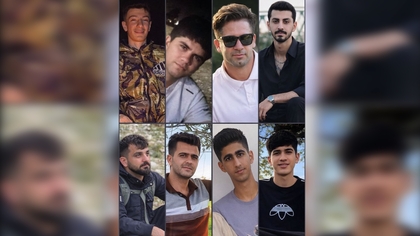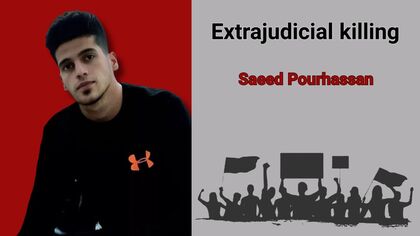Marivan: A sentence harsher than the law for Karo Alidad; Legal ambiguity in invoking “ta’zir concern” and the IRGC Intelligence report

On June 6, 2025, Karo Alidad, a 23-year-old civil and environmental activist from Marivan, was sentenced to 18 months of discretionary imprisonment, even though the legal maximum for this charge is 12 months. This verdict was issued based on the IRGC Intelligence report and an ambiguous term called “ta’zir concern”, without any other charge being proven or stated in the case.
According to a source familiar with the case who spoke to Kurdpa, on May 25, 2025, Karo Alidad, a civil and environmental activist from Marivan, was sentenced to 18 months of discretionary imprisonment by a branch of the Revolutionary Court of Marivan, presided over by Judge Azami, on the charge of “propaganda against the regime.” This sentence was issued despite the fact that under Article 500 of the Islamic Penal Code, the legal punishment for propaganda against the regime is a maximum of one year of discretionary imprisonment. Nevertheless, the Revolutionary Court of Marivan, based on the report of the IRGC Intelligence of Marivan and what was referred to as “ta’zir concern”, sentenced this civil activist to 18 months of prison.
Karo Alidad, who in February 2025 had spent 38 days in the detention center of the IRGC Intelligence in Marivan under arbitrary detention and interrogation, was sentenced to 18 months of prison under Article 500 of the Islamic Penal Code and "with consideration of Article 2 of the Law on Reducing Discretionary Imprisonment," with time served included, based on the IRGC Intelligence report of Marivan and interrogation records signed under torture and coercion, without having been informed of their contents, and no other charges were mentioned.
In May 2025, this civil and environmental activist had previously been sentenced during a court session following the indictment session to 3 months of discretionary imprisonment and 9 months suspended, but the IRGC Intelligence of Marivan opposed this ruling. After the intervention of this security body in the judicial case, and based on the IRGC Intelligence report and an amended indictment by the Marivan Public and Revolutionary Prosecutor’s Office, a new sentence of 18 months of discretionary imprisonment was issued for him. The charge of "propaganda against the regime" for this Kurdish citizen was based on his participation in protests and political activities against the regime.
Legal ambiguities and violations in the case of Karo Alidad:
Issuing a sentence beyond the law without proving a second charge; violation of the principle of proportionality in Karo Alidad’s case:
The first ambiguity in the verdict for Karo Alidad relates to the increase in punishment beyond the legal maximum. While in an earlier stage of the case, and in a file that was objected to by the IRGC Intelligence, he had been charged with “membership in groups opposed to the state,” in the recent court no reference was made to this charge, and only "propaganda against the regime" was cited as the proven charge. Nevertheless, the court issued an 18-month prison sentence, while the legal maximum under Article 500 of the Islamic Penal Code is 12 months. Based on Article 36 of the Constitution and Article 2 of the Islamic Penal Code, no judicial authority is allowed to issue a punishment beyond the defined maximum for a specific crime. Therefore, the sentence issued lacks a clear legal basis and may constitute a violation of the principle of proportionality and an overreach of judicial authority.
Arbitrary interpretation of Article 2 and illegal use of the term “ta’zir concern”:
In the text of the verdict issued for Karo Alidad, it states that "with consideration of Article 2 of the Law on Reducing Islamic Punishments and due to ta’zir concern," he was sentenced to 18 months of discretionary imprisonment. However, Article 2 only allows the court in specific cases—such as absence of prior criminal record and non-security-related crimes—to use alternative punishments. Since the charge of propaganda against the regime is considered a security offense, Karo Alidad does not qualify for mitigation. More importantly, the lack of eligibility for leniency does not permit an increase in sentence beyond the legal ceiling. Also, the term “ta’zir concern” has no definition or legal foundation in the Iranian legal system and appears to be used as an unsupported justification and personal interpretation by the judge for issuing a harsher sentence—something that violates fair trial principles and the clear text of the law.
Non-judicial interference? Citing the IRGC Intelligence report and interrogation records signed under coercion and without knowledge of content:
In the verdict for Karo Alidad, the IRGC Intelligence report of Marivan is cited as the main basis for the conviction. However, according to Articles 60, 125, and 194 of the Criminal Procedure Code, security agency reports can only serve as preliminary clues and lack definitive evidentiary value—especially when not backed by independent documentation or cross-examination by defense counsel.
In addition, interrogation records and statements attributed to the defendant during detention are cited in the case. However, according to informed sources, these confessions were obtained under arbitrary detention, coercion, and complete unawareness of the content of the documents, and without access to a lawyer. Alidad was forced to sign these interrogation records under threat and duress. According to Articles 125 and 194, such statements have no legal validity. The court’s reliance on these sources lacks legal legitimacy and contradicts the principles of fair trial.
38 days of arbitrary detention of Karo Alidad:
Karo Alidad was previously arrested on February 3, 2025 (11 Bahman 1403) by security forces without a judicial warrant at his workplace and was held and interrogated in the IRGC Intelligence detention center in Marivan.
After 38 days of detention, he was temporarily released on March 1, 2025 (11 Esfand 1403) on 800 million toman bail from Sanandaj Central Prison.
His arrest was violent; more than eight security agents attacked this Kurdish citizen’s shop in Molavi Mall, Marivan, with two vehicles and detained him with violence.
During the 38 days of arbitrary detention, he was denied access to a lawyer and family visits, and until the indictment session in May 2025, he had no knowledge of the charges or reasons for his arrest.



